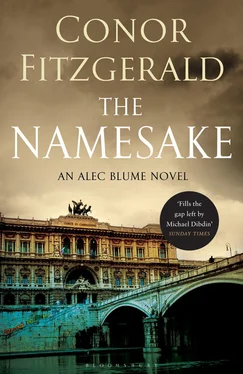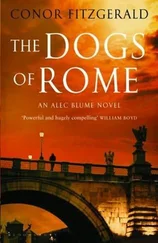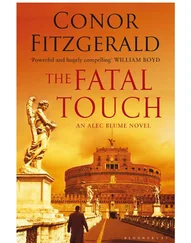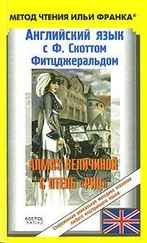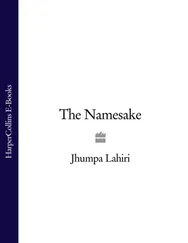Conor Fitzgerald - The Namesake
Здесь есть возможность читать онлайн «Conor Fitzgerald - The Namesake» весь текст электронной книги совершенно бесплатно (целиком полную версию без сокращений). В некоторых случаях можно слушать аудио, скачать через торрент в формате fb2 и присутствует краткое содержание. Жанр: Полицейский детектив, на английском языке. Описание произведения, (предисловие) а так же отзывы посетителей доступны на портале библиотеки ЛибКат.
- Название:The Namesake
- Автор:
- Жанр:
- Год:неизвестен
- ISBN:нет данных
- Рейтинг книги:3 / 5. Голосов: 1
-
Избранное:Добавить в избранное
- Отзывы:
-
Ваша оценка:
- 60
- 1
- 2
- 3
- 4
- 5
The Namesake: краткое содержание, описание и аннотация
Предлагаем к чтению аннотацию, описание, краткое содержание или предисловие (зависит от того, что написал сам автор книги «The Namesake»). Если вы не нашли необходимую информацию о книге — напишите в комментариях, мы постараемся отыскать её.
The Namesake — читать онлайн бесплатно полную книгу (весь текст) целиком
Ниже представлен текст книги, разбитый по страницам. Система сохранения места последней прочитанной страницы, позволяет с удобством читать онлайн бесплатно книгу «The Namesake», без необходимости каждый раз заново искать на чём Вы остановились. Поставьте закладку, и сможете в любой момент перейти на страницу, на которой закончили чтение.
Интервал:
Закладка:
Blume started rifling through the files on the floor, picking them up, stacking them on the desk.
In the corner of the room sat Arconti’s fat leather briefcase. Blume went over, glanced inside and saw papers from other cases. He dumped them on the desk. Working quickly, he started leafing through the files scattered on the desk and then those on the floor. He spent almost ten minutes going through them, trying to pick up something he could use, even if only as a benchmark to test the integrity of whatever magistrate would now take over. But it was too much. He could never pick out the essential documents in time. Already he heard the commotion and buzz working its way up the corridor. He grabbed handfuls of files at random, choosing the most densely typed ones he could find, and stuffed them into the briefcase. The piece of paper he had taken from the magistrate’s frozen hand he dropped into his inside pocket. Then he stood up, took a deep breath, and calmly opened the door, signalling to the ambulance crew and guards who were coming down the corridor. While the three of them piled into the small office, the fourth remained behind to repulse the horde of curious onlookers and concerned colleagues that had suddenly materialized.
Blume stepped over and looked down at the magistrate whose working eye seemed to have gained some focus. ‘Don’t worry, Dottore. Our case continues until you tell me otherwise.’
Arconti did not reply.
8
Rome
Back at the Collegio Romano station, the only other person from the squadra mobile to be found was the unloved Agente Rospo. When Blume passed him, he was speaking with quiet truculence, his lips almost touching the mouthpiece of the phone, and did not even look up.
Blume shut himself into his office, and slid closed a thin bolt that he had installed himself. He felt at peace here. The room was not pleasant or comfortable, but it had accrued institutional dignity over the years. It seemed as if some long-term policy was in place to renovate it at forty-year intervals. The process must have begun in the 1890s with the installation of the mahogany desk, an impossibly heavy object with dull brass handles on the drawers, topped by an expanse of bulging but still intact green leather. Forty years later, the Fascist authorities had added the heavy grey filing cabinets and a modernist interpretation of a chandelier of gunmetal and glass with sockets for three low-watt bulbs, whose light never reached the ground nor even managed to make the metal shine. The ripped club chair in the corner next to the door was from the same period. The rest of the room, including the ugly orange-and-brown painting in a steel frame on the wall, belonged to the 1970s. Forty years on, and they had supplied him with a multifunction fax-printer-scanner-photocopier and a laptop, and curly energy-saving bulbs for the chandelier.
The window looked into a shadowy void between buildings and never received direct sunlight. The soot on the window filtered out most of the light, and the dark walls of the office absorbed what was left. If he read, it was always in the yellow pool of the light of his desk lamp. While it might invite depression and introspection, the room did not admit panic. It was a good place to plan in.
His mother would not have approved of him being here. She had never dispensed nearly as much advice as his father, but he remembered her warning him about not seeking out too much solitude. It had been a day of a bad school report or something, and she had come into his room where he sat mute, alone, angry at finding himself in a strange country, fed up with having to study his school companions from a distance to see what made them tick rather than just joining in with them and making friends. First, she apologized and promised he would find his way in Rome, Italy and then the world soon enough, and then she comforted him with thoughts of going home to Seattle someday.
‘But loneliness is never a real friend, Alec. Beware of when it creeps up on you disguised as solitude, peace, independence or self-sufficiency. Do not invite it into your life because it will never leave. It will even pretend to be its exact opposite, a companion.’
Even then, she was probably too late with her advice. Besides, sometimes, such as now, solitude was a tactical necessity. He wanted no one, not even his own fully conscious self, to watch as he set about composing a forgery to entrap Agazio Curmaci.
Chief Inspector Panebianco had described the murder of Matteo Arconti as a ‘cowardly’ act. But he was wrong. Cowardice was failing to respond with conviction and power to a challenge, a description that did not fit Agazio Curmaci or whoever was behind this.
Mafia bosses were either traumatized killers or, worse, killers who were not in the slightest bit traumatized by the things they had been made to do when young. The upshot was they were always stronger than politicians and public servants, the police included. The fight against the Mafia, Blume liked to say, would never be won until the politicians did for themselves what they ordered others to do. According to Caterina, his was an argument for a police state. Fine, then. Why would a police state be worse than this Mafia one?
Agazio Curmaci was certainly senior enough to order a killing without compromising his own safety, but he could just as easily have carried it out in person. A man such as that would not take great pains to cover his tracks. With any luck, forensics would be able to get traces of his DNA from the victim, and then place him at the scene of the killing, if they ever worked out where that was.
The challenge, then, was to force the bastard out of his hiding place in Germany and draw him back into the open, back to Italy. As Blume sat in his quiet office reading the transcript of the phone call Magistrate Arconti had made to Curmaci’s wife, he saw with perfect clarity how this might be done.
According to the date stamp, the call had taken place several weeks ago. Blume read the one-sided conversation, a monologue effectively, several times and, as Arconti had already observed, the woman’s words offered absolutely nothing that could be used against her husband. On the contrary, they had been spoken with the opposite intention. It was a typical Mafia call containing the characteristic mixture of veiled threat and whining accusations of victimization. It was practically a template declaration, and there was no doubt but that she had read it out. Evidently, she had been prepared as soon as her cousins were arrested. Arconti’s side of the conversation was missing, but Blume doubted it would have made any difference to what this woman, this sorella d’omerta, said.
Dottore, I appeal to you as the mother of two children. I lay out my truth before your ideals of justice, and I beg you to resist the temptation of making such hurtful, dangerous and damaging charges against my husband, who is guilty of nothing other than being a noble father and a shining example to his children and the hardworking people of this modest town. Unable to make a living in a land too long forgotten and despised by the state, he was compelled to travel abroad, but would sooner cut his own throat than his ties with his beloved homeland. Even in my pain at his absence, I am comforted by the love and respect of the entire town for my husband, for they know him for what he is. Every man must respond to his own conscience and God, but the man you have described, the evildoer to whom you have outrageously attached my husband’s name, is unrecognizable. I pray that God will forgive you for this injury of our name when the time comes, and may the time come slowly.
I am speaking to you as a woman of peace.
It was effectively a declaration of affiliation to the Honoured Society of the Ndrangheta (I am comforted by the love and respect of the entire town for my husband, for they know him for what he is) and a threat on Arconti’s life with the references to God’s forgiveness, cut throat, and injuries. Finally, it was a way of letting Arconti know he was not going to get anything from a wiretap except elaborate declarations of innocence.
Читать дальшеИнтервал:
Закладка:
Похожие книги на «The Namesake»
Представляем Вашему вниманию похожие книги на «The Namesake» списком для выбора. Мы отобрали схожую по названию и смыслу литературу в надежде предоставить читателям больше вариантов отыскать новые, интересные, ещё непрочитанные произведения.
Обсуждение, отзывы о книге «The Namesake» и просто собственные мнения читателей. Оставьте ваши комментарии, напишите, что Вы думаете о произведении, его смысле или главных героях. Укажите что конкретно понравилось, а что нет, и почему Вы так считаете.
